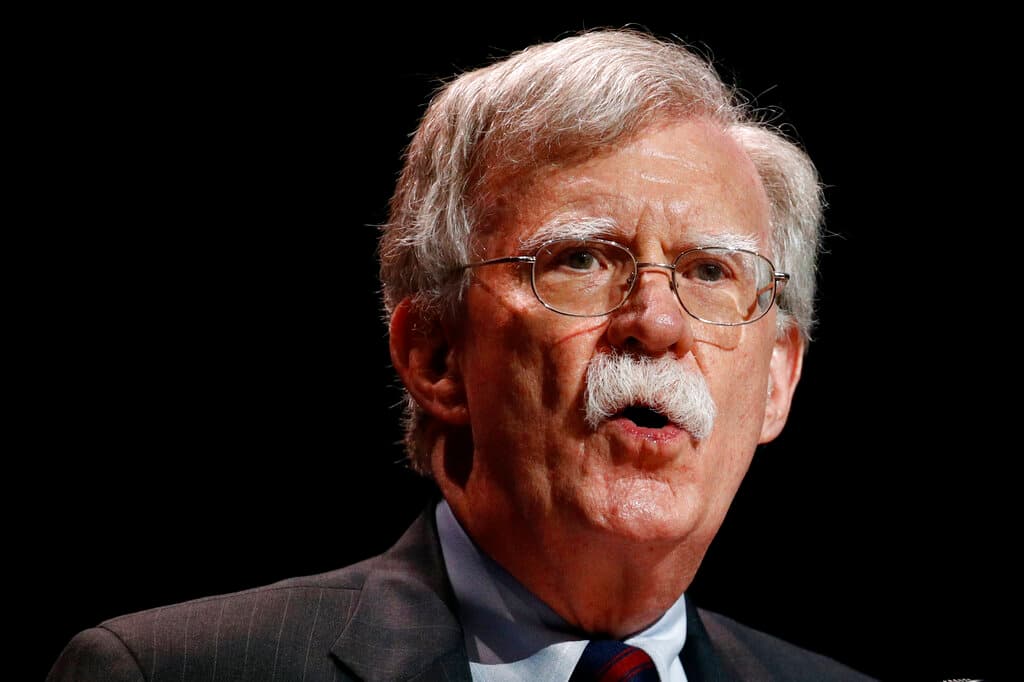Bolton Eyes Presidential Run With Campaign To Return Foreign Policy to the Political Debate
The former ambassador to the United Nations wants to move past the Trump era.

Ambassador John Bolton will decide over Christmas whether to run for President. When we connected, he was just back from doing the rounds with donors and kingmakers in Texas and California, figuring out if he has a real shot at the top job.
While Mr. Bolton has long considered running — he gave it a serious look in 2016 — the latest thing stirring him to run was “Donald Trump’s statement about terminating the constitution” and “the lack of a really definitive response” by top Republicans.
“When you say you wanna terminate the Constitution, that’s a short way of saying, I wanna overthrow the government of the United States,” says the former American envoy at the United Nations. He also blames President Trump for the Republicans’ poor showing in the midterms.
Mr. Bolton describes his platform as “fairly standard Republican fare,” with a libertarian edge. “Cut taxes, reduce regulation, get the government off the back of the people and let the economy grow… I didn’t believe in the nanny state when that’s what the Democrats were advocating … and I don’t believe in the daddy state that Republicans have advocated for.”
What really defines Mr. Bolton, though, is the view that, as he puts it, “the key to protecting the American way of life is a strong national defense.” We need to believe in victory. Reagan believed in victory, he says, and “quipped at one point when he was president, speaking about the Soviets, ‘Look, this is how it ends. We win, they lose.’”
This comment, I noted, has recently been echoed by the 36-year-old Finnish prime minister, Sanna Marin, whom Mr. Bolton had quoted to me in a previous discussion when I asked him how the war in Ukraine would end: “It ends when the last Russian soldiers leave Ukrainian territory.”
That is the right mindset, Mr. Bolton argues, and to back it up, we need a serious increase in defense spending, which he says has to be part of the 2024 debate. He acknowledges “it’s a hard issue to raise so most politicians won’t raise it,” but he says, “I’m happy to raise it.”
Mr. Bolton, who was the envoy to the UN under President George W. Bush, says America needs “to have very significant increases in the defense budget and in our sales of weapons to friends around the world. … If our military isn’t really capable of defending Taiwan without being useless everywhere else in the world, that says the military’s too small.”
America, Mr. Bolton stresses, is “nowhere near” the percentage of GDP that it spent on the military during the Reagan administration. He reckons that the reason to have more defense spending is “precisely to avoid the risk that our adversaries will think we’re too weak to defend ourselves and our allies.”
“The American voter,” he argues, “should be treated as an adult.”
To Mr. Bolton, that means transparently explaining the threats we face and laying out a straightforward case for why a muscular national defense is important. “I don’t think there’s any doubt that China’s the existential threat that the United States faces in the 21st century,” the former ambassador asserts.
“I just think politicians don’t treat voters like adults,” Mr. Bolton adds, “I think if you do treat them like adults, explain what the issue is and your proposals to deal with it, that they’ll take it seriously too. They at a gut level, I think understand better than a lot of our political consultant class that America is unique in the world and that how we keep it that way is important.”
That includes, he adds, the serious threats we face from “Huawei and ZTE in their efforts to take control of fifth generation telecommunications around the world” as “arms of the Chinese state” are not well understood, nor is the “need to enmesh Taiwan in collective defense structures so it’s not the US alone defending Taiwan.”
Why, I ask, should the American people care about these issues when they are worried about rising prices and poor education for their children?
“Well,” responds Mr. Bolton, “the nature of the way of life we have here at home is best protected when you have a strong American presence in the world that prevents other countries from impinging on our way of life or constraining us.”
“We don’t have any inherent desire to constrain anybody else,” Mr. Bolton argues. Yet “over and over again in our history… we have found external powers, whether for traditional power politics reasons or for ideological reasons or whatever mixture it is in the case of China, that don’t want us to live our way of life on our own.”
Mr. Bolton’s warning is that “you can either deal with those problems early or you can deal with those problems late. And I think history is pretty clear that if you deal with the problems earlier, the costs are going to be lower and the chances of success higher.”
Throw in a heavy dose of optimism, and you’ve got a decent picture of what Bolton for President might look like. “I think the Republican party wins,” he says, “when it presents to the American people an optimistic view of how to solve their problems.” Reagan, he adds, had it right with his “It’s Morning in America” slogan and the “famous bear in the woods ad where a lone rifleman confronts a bear” symbolizing Russia.
When I asked him where these beliefs, deep down, come from, he points to Barry Goldwater, whose books, “The Conscience of a Conservative” and “Why Not Victory,” he read at 15. Mr. Bolton says he is sick of the negativity of the “politics of the Democratic party, the politics of complaining and persecution and grievance,” and is disappointed Republicans have adopted the mantra.
Mr. Bolton wants to end the Trump era, which, he argues, “has been the era of American carnage, of how bad things are.”
“A change in the psychology of the party would be hugely important,” Mr. Bolton says. “I just think Americans overall respond to a leader who says, we have very serious problems in front of us, but you never vote against America. There are ways to get through it.”
Does he wants actually to be President or is he running just to make that point? If he “announces his candidacy,” he responds, it would be with the goal of winning. “I’m not a protest candidate,” he says.

